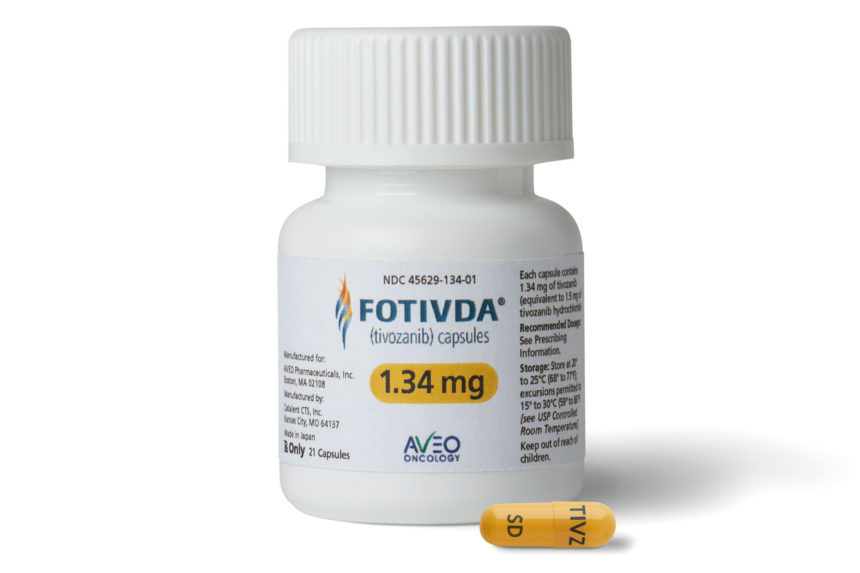Keytruda (pembrolizumab) vs Fotivda (tivozanib)
Keytruda (pembrolizumab) vs Fotivda (tivozanib)
Keytruda (pembrolizumab) is an immune checkpoint inhibitor that works by blocking the PD-1 pathway, thereby enhancing the body's immune response against cancer cells, and is commonly used for a variety of cancers, including melanoma, non-small cell lung cancer, and head and neck cancer. Fotivda (tivozanib), on the other hand, is a tyrosine kinase inhibitor that targets vascular endothelial growth factor receptors (VEGFRs), and is specifically indicated for the treatment of advanced renal cell carcinoma (RCC). When deciding between Keytruda and Fotivda, it is crucial to consider the type of cancer being treated, the patient's overall health, and the specific mechanism of action of each drug, as well as consulting with a healthcare provider for a personalized treatment recommendation.
Difference between Keytruda and Fotivda
| Metric | Keytruda (pembrolizumab) | Fotivda (tivozanib) |
|---|---|---|
| Generic name | Pembrolizumab | Tivozanib |
| Indications | Various types of cancers including melanoma, lung cancer, head and neck cancer, Hodgkin lymphoma, and stomach cancer | Advanced renal cell carcinoma |
| Mechanism of action | Programmed death receptor-1 (PD-1) blocking antibody | Vascular endothelial growth factor receptor (VEGFR) tyrosine kinase inhibitor |
| Brand names | Keytruda | Fotivda |
| Administrative route | Intravenous infusion | Oral |
| Side effects | Fatigue, musculoskeletal pain, decreased appetite, itching, diarrhea, nausea, rash, fever, cough, dyspnea, constipation, pain, and abdominal pain | Hypertension, diarrhea, fatigue, dysphonia, hypothyroidism, decreased appetite, nausea, stomatitis, vomiting, weight decreased, asthenia |
| Contraindications | None specifically listed; however, should be used with caution in patients with a history of severe immune-mediated adverse reactions | None specifically listed; however, patients should be monitored for hypertension and proteinuria |
| Drug class | Anti-PD-1 monoclonal antibody | Tyrosine kinase inhibitor |
| Manufacturer | Merck & Co. | Aveo Pharmaceuticals |
Efficacy
Keytruda (Pembrolizumab) Efficacy in Kidney Cancer
Keytruda, known generically as pembrolizumab, is a type of immunotherapy that has shown efficacy in the treatment of kidney cancer, specifically advanced renal cell carcinoma (RCC). Pembrolizumab is a programmed death receptor-1 (PD-1) blocking antibody that helps the immune system to detect and fight cancer cells. In clinical trials for kidney cancer, Keytruda has been evaluated both as a monotherapy and in combination with other therapies. When used in combination with axitinib, a tyrosine kinase inhibitor, pembrolizumab has been shown to significantly improve overall survival and progression-free survival compared to sunitinib in the first-line treatment of advanced RCC.
Results from the KEYNOTE-426 study, a phase 3 trial, demonstrated that the combination of pembrolizumab and axitinib reduced the risk of death by nearly half compared to sunitinib, which is a standard treatment. The combination also improved the response rate and delayed disease progression. This has led to the approval of pembrolizumab in combination with axitinib by regulatory agencies for the first-line treatment of patients with advanced RCC, marking a significant advancement in the management of this type of cancer.
Fotivda (Tivozanib) Efficacy in Kidney Cancer
Fotivda, with the generic name tivozanib, is another targeted therapy approved for the treatment of advanced renal cell carcinoma. Tivozanib is a vascular endothelial growth factor (VEGF) receptor tyrosine kinase inhibitor that works by inhibiting the growth of new blood vessels to the tumor, effectively starving the cancer of the nutrients it needs to grow. In clinical trials, tivozanib has shown efficacy as a treatment for RCC in patients who have received prior antiangiogenic therapy.
The pivotal phase 3 trial known as TIVO-3 compared tivozanib to sorafenib, another tyrosine kinase inhibitor, in patients with refractory advanced RCC. The study found that tivozanib significantly improved progression-free survival compared to sorafenib. Additionally, tivozanib demonstrated a favorable safety profile and was generally well-tolerated. These findings have contributed to the approval of tivozanib for the treatment of adult patients with relapsed or refractory advanced RCC following two or more prior systemic therapies.
Regulatory Agency Approvals
Keytruda
-
European Medical Agency (EMA), European Union

-
Food and Drug Administration (FDA), USA

-
Health Canada

-
Therapeutic Goods Administration (TGA), Australia

-
Medsafe (NZ)

Fotivda
-
European Medical Agency (EMA), European Union

-
Food and Drug Administration (FDA), USA

Access Keytruda or Fotivda today
If Keytruda or Fotivda are not approved or available in your country (e.g. due to supply issues), you can access them via Everyone.org.
How it works

Make an enquiry
Choose the medicine you want to buy, answer a couple of questions, and upload your prescription to speed things up. We’ll get back to you within 24 hours.


Make an enquiry
Choose the medicine you want to buy, answer a couple of questions, and upload your prescription to speed things up. We’ll get back to you within 24 hours.


Breeze through the paperwork
We'll guide you through the required documents for importing unapproved medicine, ensuring you have all the necessary information.


Get a personalized quote
We’ll prepare a quote for you, including medicine costs and any shipping, administrative, or import fees that may apply.


Receive your medicine
Accept the quote and we’ll handle the rest - sourcing and safely delivering your medicine.

Some text on this page has been automatically generated. Speak to your physician before you start a new treatment or medication.
Let's talk
If you have any questions, call us or send us a message through WhatsApp or email:
Contact us




